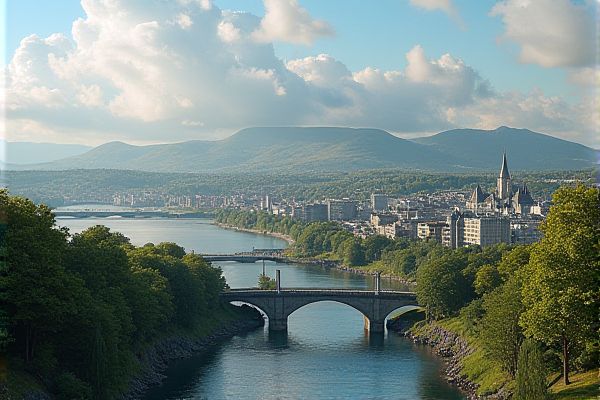
Emergency services and contact information in Ireland: Emergency Services Number: Dial 112 or 999. Police: Garda Siochana. Fire Brigade: Contact via 112/999. Ambulance Services: Access through 112/999. Coast Guard: Part of emergency services response. Use Eircodes for location accuracy. Text Service for hearing/speech impairments: Register with emergency services. Hospitals: Know nearest locations in advance. Poison Information: Call National Poisons Information Centre. Non-emergency Garda contact: Local station numbers.
Emergency Services Number: Dial 112 or 999.
In Ireland, you can contact emergency services by dialing the easily remembered numbers 112 or 999, which will connect you to fire, ambulance, and police services. When calling, it is crucial to be prepared to provide the exact address, clear directions, your phone number, and specific details about the incident to ensure a swift response. For more information on emergency contacts and practical advice, you can visit their official website at Ireland.com, which offers comprehensive guidance on navigating such situations efficiently.
Police: Garda Síochána.
To contact the Garda Siochana, the national police force of Ireland, use the emergency services number 999 or 112. For less urgent situations, it is advisable to contact your local Garda station. If you need to provide confidential information, consider using the Garda Confidential Line at 1800 666 111 or Crimestoppers at 1800 250 025. For more detailed information, please visit the official site of the Garda Siochana.
Fire Brigade: Contact via 112/999.
In Ireland, in the event of a fire emergency, it is vital to dial 112 or 999 to reach the emergency services operator. This will connect you promptly to the appropriate fire services. For more comprehensive guidance, visit the detailed Emergency Contacts section on the Ireland website, which provides essential information about safety protocols and who to contact during various emergencies.
Ambulance Services: Access through 112/999.
In Ireland, accessing ambulance services is straightforward by calling the universal emergency numbers 112 or 999. These numbers are free of charge, ensuring that everyone can connect to the closest emergency medical services when needed. This critical connection includes the National Ambulance Service and the Dublin Fire Brigade's emergency ambulance service, both of which are ready to provide rapid assistance. For more detailed information and guidance on emergency procedures, you can visit the Ireland Travel website, which offers comprehensive resources for travelers and residents alike.
Coast Guard: Part of emergency services response.
The Irish Coast Guard, part of the Department of Transport, serves as the national maritime emergency response service. It is responsible for a multitude of critical tasks including search and rescue, medical transport, assisting ships, marine communications, and pollution protection. For anyone in need of immediate assistance, it is crucial to contact emergency services by dialing 112 or 999. More comprehensive details about the Irish Coast Guard and its operations can be found online, ensuring the safety and support of maritime activities remains a top priority across Ireland.
Use Eircodes for location accuracy.
Providing an Eircode along with an address significantly enhances location accuracy for emergency services in Ireland, as it allows the National Ambulance Service and Emergency Call Answering Service to swiftly and precisely locate the caller's location using the geographic coordinates in the Eircode database.
Text Service for hearing/speech impairments: Register with emergency services.
The Emergency SMS/Text Service in Ireland provides a vital channel for individuals with speech or hearing impairments to reach emergency assistance. By sending an SMS/Text message to 112, those in need can contact the Emergency Call Answering Service (ECAS), which then efficiently relays the message to the appropriate emergency service, whether it's Garda, Ambulance, Fire, or Coast Guard. For more detailed information, you can visit the Emergency SMS/Text Service page.
Hospitals: Know nearest locations in advance.
For anyone in need of medical assistance or planning a visit, the Health Service Executive offers a comprehensive list of hospitals in Ireland. This resource allows you to find and locate the nearest hospitals, sorted alphabetically for easy reference, ensuring that you can access necessary healthcare facilities without hassle.
Poison Information: Call National Poisons Information Centre.
The National Poisons Information Centre (NPIC) in Ireland offers a vital around-the-clock service for healthcare professionals, ensuring immediate access to expert advice through contact numbers such as 01 809 2566 or 01 837 9964. Additionally, there is a dedicated Public Poisons Information Line available at 01 809 2166, operating from 8 AM to 10 PM, to assist members of the public worried about accidental poisoning incidents. For more comprehensive information and resources, individuals can visit the National Poisons Information Centre's website. Outside of the public line's operating hours, calls are redirected to the UK National Poisons Information Service, ensuring continuous support is available.
Non-emergency Garda contact: Local station numbers.
For non-emergency situations, you can contact your local Garda station using the phone numbers listed for each station. These numbers are organized alphabetically by location. For more information, you can visit their website at Garda Station Contacts.
